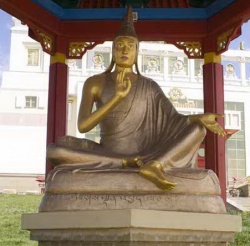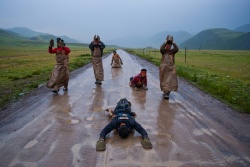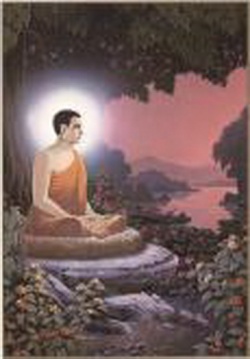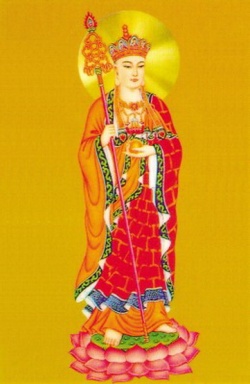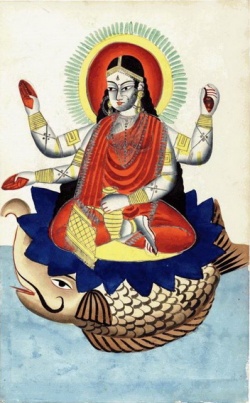Difference between revisions of "Eight great charnel grounds"
(Created page with "On the ordinary level, the eight great charnel grounds (Skt. ''aṣṭamahāśmāśāna''; Wyl. ''dur khrod chen po brgyad'') are the burial sites around a cit...") |
|||
| Line 1: | Line 1: | ||
| + | {{DisplayImages|1096|2100|4|265|1386}} | ||
On the ordinary level, the [[eight great charnel grounds]] (Skt. ''[[aṣṭamahāśmāśāna]]''; [[Wyl.]] ''[[dur khrod chen po brgyad]]'') are the burial sites around a city to accommodate the [[rituals]] of the different [[Indian]] [[castes]]. From the [[spiritual]] point of [[view]], they are the places where the dismembered parts of [[Rudra]]'s [[body]] came to rest, after they were scattered from the top of [[Mount Malaya]]. The [[energy centres]] of his [[body]]—the [[head]], [[heart]], [[naval]], and [[genitals]]—fell in the [[four cardinal directions]]; his four limbs fell in the four [[intermediate directions]]. From these parts, eight great [[trees]] arose, and around these [[trees]] developed the '''[[eight great charnel grounds]]'''. | On the ordinary level, the [[eight great charnel grounds]] (Skt. ''[[aṣṭamahāśmāśāna]]''; [[Wyl.]] ''[[dur khrod chen po brgyad]]'') are the burial sites around a city to accommodate the [[rituals]] of the different [[Indian]] [[castes]]. From the [[spiritual]] point of [[view]], they are the places where the dismembered parts of [[Rudra]]'s [[body]] came to rest, after they were scattered from the top of [[Mount Malaya]]. The [[energy centres]] of his [[body]]—the [[head]], [[heart]], [[naval]], and [[genitals]]—fell in the [[four cardinal directions]]; his four limbs fell in the four [[intermediate directions]]. From these parts, eight great [[trees]] arose, and around these [[trees]] developed the '''[[eight great charnel grounds]]'''. | ||
Revision as of 00:51, 29 January 2014
On the ordinary level, the eight great charnel grounds (Skt. aṣṭamahāśmāśāna; Wyl. dur khrod chen po brgyad) are the burial sites around a city to accommodate the rituals of the different Indian castes. From the spiritual point of view, they are the places where the dismembered parts of Rudra's body came to rest, after they were scattered from the top of Mount Malaya. The energy centres of his body—the head, heart, naval, and genitals—fell in the four cardinal directions; his four limbs fell in the four intermediate directions. From these parts, eight great trees arose, and around these trees developed the eight great charnel grounds.
Symbolism
Template:Unreferenced section All of the eight great charnel grounds contain certain elements, the symbolism of which may be understood as follows:
- The great trees represent the central channel of the practitioner.
- The charnel ground itself represents the complete paths of sutra and tantra.
- The four kinds of corpses are
- Fresh corpses representing cyclic existence—the sufferings of birth, old age, sickness, and death.
- Impaled, hanging, dismembered and decaying corpses symbolise the death of ego.
- Skeletons represent emptiness.
- Zombies or mindless corpses symbolise selflessness.
- Devouring animals symbolise the realisation of the 'generation stage'—the animals devour the 'corpses' of ordinary appearances and perceptions.
- Lake - symbolise relative bodhichitta.
- The clouds above are the white drops of bodhichitta at the crown of the head.
- Fires symbolise the 'inner heat' (Tib. tummo).
- The directional protectors symbolise the ‘downward-voiding wind’, located just below the navel.
- The realm protectors symbolise the ‘life-supporting wind’, located at the heart.
- Mountains symbolise the immovability of meditative equipoise placed single-pointedly on the union of great bliss and emptiness.
- Stupas represent the attainment of the three kayas of the Buddha.
- Nagas symbolise the cultivation of the ten paramitas.
- The gems held by the nagas represent the four ways of gathering disciples.
- The yogins and yoginis are those practitioners at the level of upholding the tantric samayas.
- The vidyadharas of the human and god realms are those practitioners who have realised the ‘generation stage’.
- Themahasiddha's are those practitioners who have realised the ‘completion stage’.
The Peaceful Mandala
- The Cool Grove (Skt. Śītavana; Wyl. bsil ba’i tshal) in the east, situated near Bodhgaya, India
- Perfected in Body (Tib. Kula Dzokpa, Wyl. sku la rdzogs) in the south
- Lotus Mound (Tib. Pema Tsek, Wyl. padma brtsegs) in the west
- Lanka Mound (Tib. Lanka Tsek, Wyl. laṅka brtsegs) in the north
- Spontaneous Mound (Tib. Lhundrup Tsek, Wyl. lhun grub brtsegs) in the south-east, situated around Boudhanath, Nepal
- Display of Great Mystery (Tib. Salchen Rolpa, Wyl. gsang chen rol pa) in the south-west
- All-pervading Utter Joy (Wyl. he chen brdal ba) in the north-west
- Mound of the World (Tib. Jikten Tsek, Wyl. 'jig rten brtsegs) in the north-east[1]
The Wrathful Mandala
The Most Fierce (East)
(Wyl. shar du gtum drag) In the eastern charnel ground is a nagkesar tree called Naga Tree. At its foot is the guardian of the east called Indra. He is yellow, holds a vajra and skull-cup, and rides a white elephant. At the top of the tree there is a white regional guardian called Elephant Face. Below there is a lake called Water of Compassion in which there is a white naga called Increasing Wealth. In the sky above, there is a cloud called Making Sounds. The precious mountain called Mount Meru has a fire called Wisdom Fire blazing at its base, and a white stupa called Stupa of Enlightenment at its peak.
Endowed with Skeletons (South)
(Wyl. lhor keng rus can) In the southern charnel ground is a mango tree called Tsuta. At its foot is the guardian of the south called Yama. He is blue, holds a staff and skull-cup, and rides on a buffalo. At the top of the tree there is a black regional guardian called Buffalo Face. In the lake below there is a white naga called Lotus, and in the sky above there is a cloud called Moving. The yellow mountain called Malaya has a fire of wisdom blazing at its base, and a white stupa on its peak.
Blazing Vajra (West)
(Wyl. nub tu rdo rje ‘bar ba) In the western charnel ground is a banana tree called Kangkela. At its foot is the guardian of the west called Water Deity, or Varuna in Sanskrit. He is white with a hood of seven snakes. He holds a snake-rope and skull-cup and rides on a crocodile. At the top of the tree there is a red regional guardian called Crocodile Face. In the lake below there is a blue naga called Karakota, and in the sky above there is a cloud called Wrathful. The white mountain called Kailash has a fire of wisdom blazing at its base, and a white stupa on its peak.
Dense Thicket (North)
(Wyl. byang du tshang tshing ‘khrigs pa) In the northern charnel ground is a bodhi tree called Ashuta. At its foot is the guardian of the north called Vaishravana. He is yellow, holds a mongoose and skull-cup, and rides on the back of a man. At the top of the tree there is a yellow regional guardian called Human Face. In the lake below there is a naga called Jogpo, and in the sky above there is a cloud called Making Loud Sounds. The green mountain called Mandara has a fire of wisdom blazing at its base, and a white stupa on its peak.
Auspicious Grove (South-East)
(Wyl. mer bkra shis tshal) In the south-eastern charnel ground is a karaya tree called Karanza. At its foot is the guardian of the south-east called Fire Deity, or Agni in Sanskrit. He is red, holds a mala, a long-necked vase, and a skull-cup, and rides on a goat. At the top of the tree there is a red regional guardian called Goat Face. In the lake below there is a yellow naga called Carrying a Conch-shell, and in the sky above there is a cloud called Completely Full. The yellow mountain called Fragrant Incense has a fire of wisdom blazing at its base, and a white stupa on its peak.
Black Darkness (South-West)
(Wyl. mun pa nag po) In the south-western charnel ground is a bataki tree called Padre-yaga. At its foot is the guardian of the south-west called Possessing a Rosary of Human Heads, or Kardava in Sanskrit. He is naked, blue in colour, holds a sword and skull-cup, and rides on a zombie. At the top of the tree there is a black regional guardian called Zombie Face. In the lake below there is a white naga called Possessing Lineage, and in the sky above there is a cloud called Descending. The white mountain called Possessing Snow has a fire of wisdom blazing at its base, and a white stupa on its peak.
Resonant with “Kilikili” (North-West)
(Wyl. rlung du ki li ki li’i sgra sgrog pa; Skt. kilikilarava) In the north-western charnel ground is an arjuna tree called Parthipa. At its foot is the guardian of the north-west called Wind Deity, or Vayuni in Sanskrit. He is smoke-coloured, holds a yellow banner and skull-cup, and rides on a deer. At the top of the tree is a green regional guardian called Deer Face. In the lake below there is a red naga called Boundless, and in the sky above there is a cloud called Wrathful. The blue mountain called Mountain of Glory has a fire of wisdom blazing at its base, and a white stupa on its peak.
Wild Cries of Ha Ha (North-East)
(Wyl. ha ha rgod pa) In the north-eastern charnel ground is a walnut tree called Nadota. At its foot is the guardian of the north-east called Ishvara. He is white, holds a trident and skull-cup, and rides a bull. At the top of the tree there is a white regional guardian called Bull Face. In the lake below there is a white naga called Great Lotus, and in the sky above there is a cloud called Unmoving. The black mountain called Great Power has a fire of wisdom blazing at its base, and a white stupa on its peak.
In each of the eight charnel grounds the regional guardian holds a red triangular-shaped torma and a skull-cup, and sits in the top of the tree with the upper half of his body emerging above the branches. The lake, fire, and stupa in each of the charnel grounds have the same names as those in the eastern charnel ground. In addition to these eight features, each charnel ground has various creatures such as crows, owls, eagles, foxes, snakes, and bull-headed snakes; as well as other manifestations such as spirits, zombies, and flesh-eating spirits. There are also many different tantric meditators in the aspect of humans and gods, and many yogins and yoginis manifesting in various forms. Everything inside the charnel grounds - such as the lakes, clouds, and animals - is considered to be an emanation of Vajrayogini.
References & Notes
- Robert Beer, Tibetan Symbols and Motifs, page 250
- A Monograph on a Vajrayogini Thanka Painting (endnote 15)
- Written by Julie O'Donnell, Pennie White B.A. Dip.Ed., Rilla Oellien and Evelin Halls
- Consultants: John D. Hughes Dip. App. Chem. T.T.T.C. GDAIE
- ↑ This list can also be found in Gyurme Dorje and Matthieu Kapstein's glossary for The Nyingma School of Tibetan Buddhism by Dudjom Rinpoche. See glossary, page 157.
Source
RigpaWiki:Eight great charnel grounds
